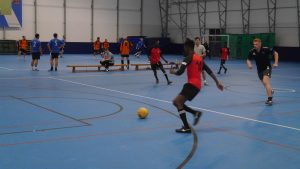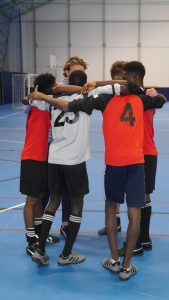Meet Nations United FC: Chichester’s all-refugee football team
Football is a cosmic force. It possesses the unbridled capability to collapse cultural barriers, unite humanity and provide hope. This equips the sport with a capacity to act as a social glue; something that is being mobilised by one West Sussex-based amateur side.
Nations United FC are a group of fervent teenagers who gather in Chichester twice a week. They meet once to train and once to play in six-a-side league. They share a marked passion for football and they are also one of the UK’s first all-refugee teams.
The side was established one year ago by Sanctuary in Chichester — a volunteer-led organisation dedicated to making Chichester a welcoming place for refugees and asylum seekers.
The concept was crafted during a drop-in session held by the sanctuary for Unaccompanied Asylum Seeking Children (UASC). Local teenagers —who were all under care of the local authorities — gathered to play pool and table tennis, but volunteers noted a desire among them for something more active.
And so, Nations United was established. The original group of 20 players first trained at Chichester College and won their first two matches soon after. Since then, the project has blossomed through partnerships with institutions such as the FA, Amnesty International and the University of Chichester, where they now are now based.
During the course of the year, they have welcomed players from a wide array of countries that include Somalia, Eritrea, Sudan, Iraq, Afghanistan, Morocco, Ivory Coast and Albania among several others.
They have all converged to form Nations United; a space where teenage refugees are able to congregate, forge friendships and crucially, be a part of something.

Jon Bowra, one of the facilitators of the project, highlights Nations United’s role in providing a social platform for local refugees.
“There are a lot of issues for young black men in this country,” he said. “They sometimes struggle to find a place and a role in society.
“The best way we can help is to provide an opportunity for them and there is a clear moral philosophy behind Nations United. We have a desire to behave in an empathetic, empowering and caring way to enhance the well-being of the guys and society as whole.
“We currently live in a society that is susceptible to bitterness and resentment, so it is important to provide something that is enhancing rather than stigmatising and blaming them. These guys can make a real contribution if given the platform to do so. And for us, football is that platform.”
Many initiatives across the globe have accentuated the importance of football for refugees. This includes Amnesty International’s ‘Football Welcomes 2018’ campaign which celebrated refugees’ contribution to British football, while also promoting the benefits of further participation, which are limitless.
“Let’s not forget the role of mental health in this,” Jon said. “Some of them have been utterly traumatised and have been on incredible journeys.
“Without the focus of football in refugee camps, it has been well documented how tensions would have got out of hand. This is not some kind of idealistic nonsense; it has been researched and evaluated. Football can be an incredible tool for healing.”
Since its formation, Nations United has seen a high turnover of players with over 50 teenagers having trained with the side in total. This figure alone exposes the volatility of life for many UK-based refugees.
“We see some players disappear if they have not been given the right to remain in the country by authorities,” Jon said. “We had one player who trained with us on the Thursday before getting deported on the Friday. It can be very unpredictable.
“But the consistency of the project is one of its strengths. We are always training at the same time every week, so people can always come back if they disappear for a while.”
Numbers have also fluctuated due to players departing in order to join local sides. These are Nations United’s success stories. By starting at Nations United and moving on to pastures new, players have integrated with wider society.
With this emphasis on integration, the improvement of language skills must be an integral part of the project. This is one of the key challenges facing Nations United due to the diverse range of nationalities within the team. The players have a translator to assist them. Her name is Maria, from Somalia. She is available to help the players communicate as it becomes difficult when some players speak limited English.
“Language is the key, but also the barrier,” said Steve Gough, who is the co-facilitator of the project alongside Jon.
“It’s not just about kicking a ball around. It is a pathway to developing language skills and increasing access to education,” Steve noted. “We have a project beginning next year to promote language skills through football. We are keen to develop more language skills opportunities.”

The saving grace is that football is a common language, which is what makes Nations United such a highly functional entity.
As well as integrating with wider society, it is equally important that players intermix with each other to strengthen team bonds. Nations United has thrived in this respect, but Jon noted that tensions do occasionally rise among the team, as with any group of people.
“There will be some tensions with any group. For example, there is no reason why someone from Sudan would want to play with someone from South Sudan. They’ve been at war.
“There is no reason why anybody should be angelic. Why should they? They are just like the rest of us. Some people don’t get along with others and that is the reality of life. But on the whole, the atmosphere is a positive one.”
Nations United is by no means limited to its social aspect. The team also succeeds in developing other facets of the players, such as their footballing ability.
Last week, the focus was on passing between the lines. Coaches played a montage to the players before training that laid bare the intricacies of Xavi, Sergio Busquets and David Silva’s passing style. Through simply observing the team engage these videos, it is clear that these players are devoted to progressing their skills.
One of those players is Jelani. He moved from Eritrea to Chichester in 2016 and plays up front for Nations United. He was one of those who initially suggested the idea of the team and is now the only player to have been there since the start. During an uncertain time in his life, football was a constant thread.
“I played for a team in my home country and now I’m playing here too,” he said. “It is how a lot of us make friends. It’s a place where I can enjoy myself and communicate with people.
“I’ve made a lot of friends here and we may not have met otherwise. My teammates know me as a player and a friend.”
Jelani’s enthusiasm for football is almost tangible. His love and knowledge of the game have evolved during his time with Nations United and he has now ventured into coaching. He hopes to make a living out of the sport in his new country.
“Football is my career now. It’s what I want to do.”
That’s the power of football. It corrupts and divides within its higher echelons, but when stripped down to its purest form, football simply presents an opportunity. And no one understands that better than Nations United.
Featured photograph/Peter Flude Photography